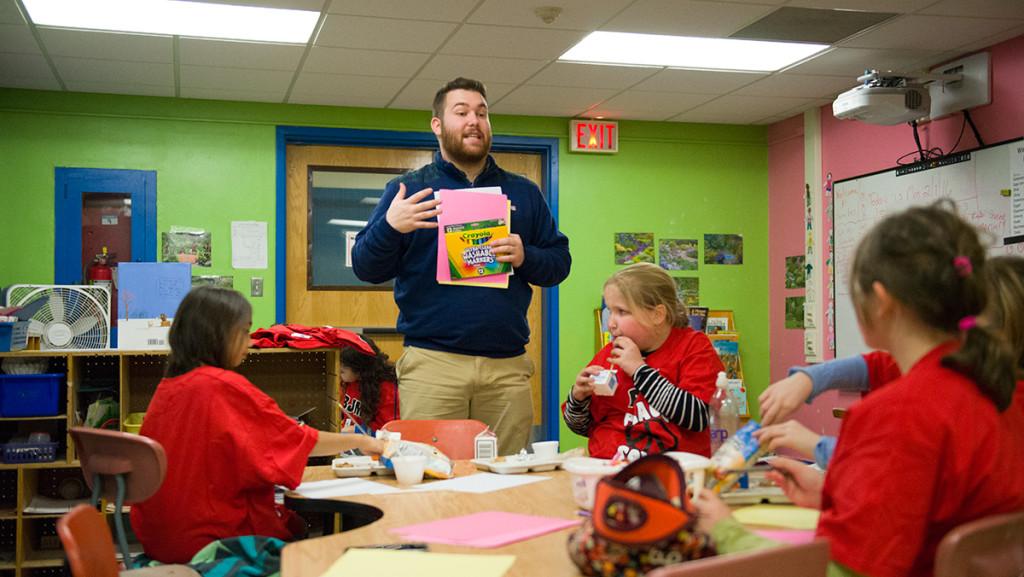What began as a class requirement last fall has turned into an outside commitment by junior Daniel Block, a music education major who is now running a student leadership program on his own at Beverly J. Martin Elementary School in the Ithaca City School District two days a week.
Opinion Editor Kayla Dwyer spoke with Block, who is the program’s coordinator, to discuss what brought him to Beverly J. Martin, the work he does with the students and what inspired him to stay.
Kayla Dwyer: Could you first describe what the student leadership program is at BJM?
Daniel Block: The program is designed for students in grades three through five. It’s basically about them learning leadership skills and respect and how to make the school a better place. It starts with conflict management, and there they learn leadership skills, what it means to be a leader, and they’re taught a 12-step process how to solve a problem. Then they take that and use that in their classes, in the school and on the playground, especially. The leadership pods, which was started last spring — me and my professor Dr. Nia Makepeace started that together, and that has grown to be a success. Smaller groups of students, six or seven, who’ve already been through conflict management, meet during their lunch or recess, and they participate in school action projects. An example of those is “new student orientation pod,” which is all about new students coming into the school, helping them become oriented and to make their first few weeks the most successful they can be. Another one is “school spirit pod,” which is all about bringing the school together. We actually have a canned food drive coming up in February, which is going to be a little competition among the classes, to donate cans and food to the local food pantry.
KD: How, as a music student, did you get started with this?
DB: It actually started as a field experience for my class, Educating Students with Special Needs in Diverse Classrooms, and Dr. Nia, who was the professor of that course, has basically become a mentor of mine. It started as a field experience but grew into much more than just a field experience. I fell in love with BJM, and I could have left after my field experience, but I decided to stay and try this new thing called pods. … I’ve always — throughout my schooling before IC — I’ve always been into leadership and doing leadership-oriented things, so coming here sparked an interest in me when I got the opportunity to do this as my field experience, and then I just fell in love with the school, fell in love with the kids and wanted to continue with being a part of the community.
KD: Why elementary kids? Many of the leadership programs I’ve heard of begin in middle or high school.
DB: The core values of the Ithaca school district are to educate, empower and engage. So especially empowerment, at such a young age, I think is really important to the elementary school kids, and allowing them to think for themselves and to be engaged in activities that make them interested in learning what you have to offer. … There need to be leaders in the school and people that can lead by example, so to get those students that are true leaders to be an example for other students is key. Also, what I really like about this program is we don’t only focus on the leaders of the school, … but we also try to focus on students that are kind of at risk, or students who have the potential to be leaders but are troublemakers in the classroom, so we try to turn that around and make them be aware of what they’re doing, and try to teach respect and get them out of that red zone and back into being a leader of the school.
KD: Do any particular students or success stories or anecdotes stand out when you talk about this?
DB: One example in particular I can think of: This is someone that has always sort of been a leader, but I think they kind of were in the background, but was a leader in the classroom as in demonstrating by example. … They came out of their shell and were able to influence more than one person in the classroom setting.
KD: What is it that makes this worthwhile for you? Why did you stay?
DB: I think the number–one thing that makes me stay is the students themselves. We’ve kind of grown this bond and connected, so I think being able to walk into a space, having everyone come up — they call me “Mr. Dan” — especially at the beginning of this year, they all came up and hugged me and said, “We’re so glad you’re back,” and just being able to influence them and make them better — better students, better people, better citizens in the community — that’s definitely my number–one thing. … It’s such a unique school community, especially in Ithaca. BJM is, at least what I’ve heard from faculty members, is just a completely different animal than all the other elementary schools.
KD: Why is that?
DB: I think BJM is very diverse, and I think that’s part of the reason why it’s so special. The teachers, the student support staff — it’s just such a great community, and everyone understands that.















